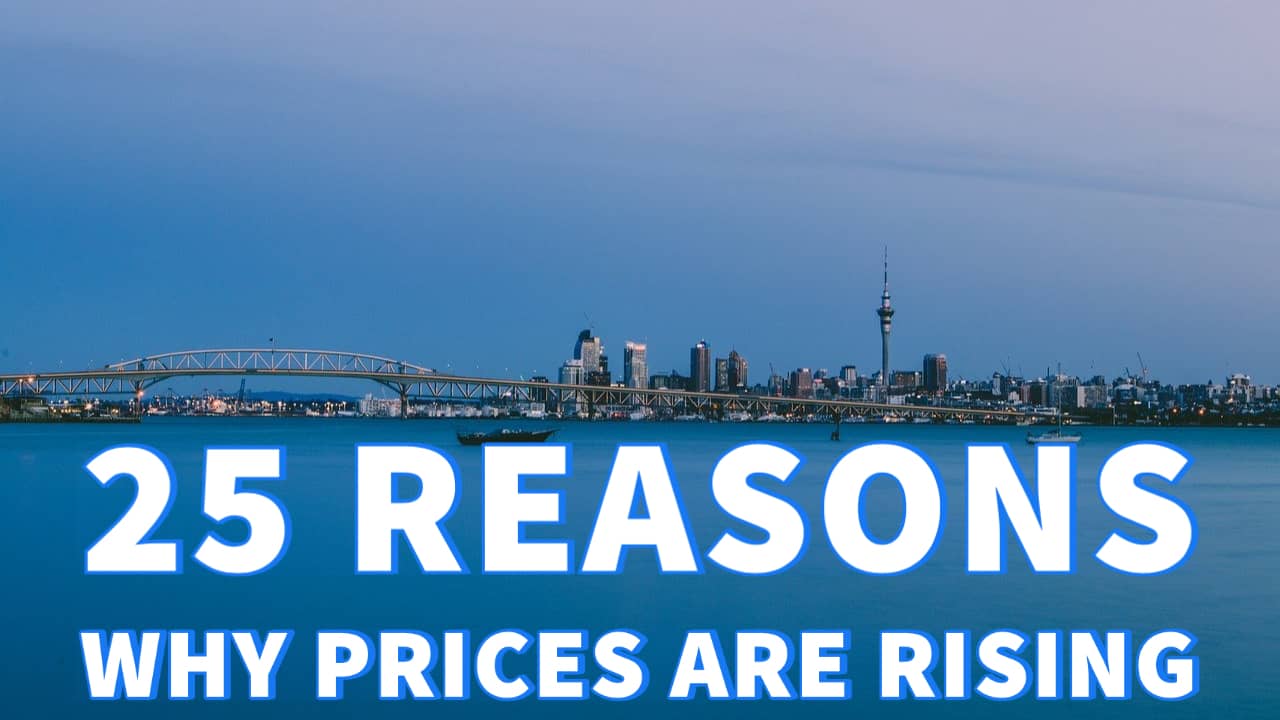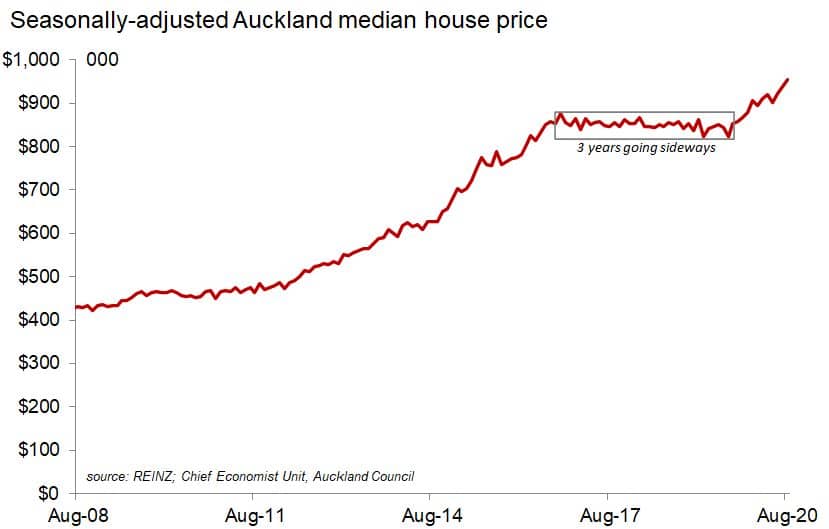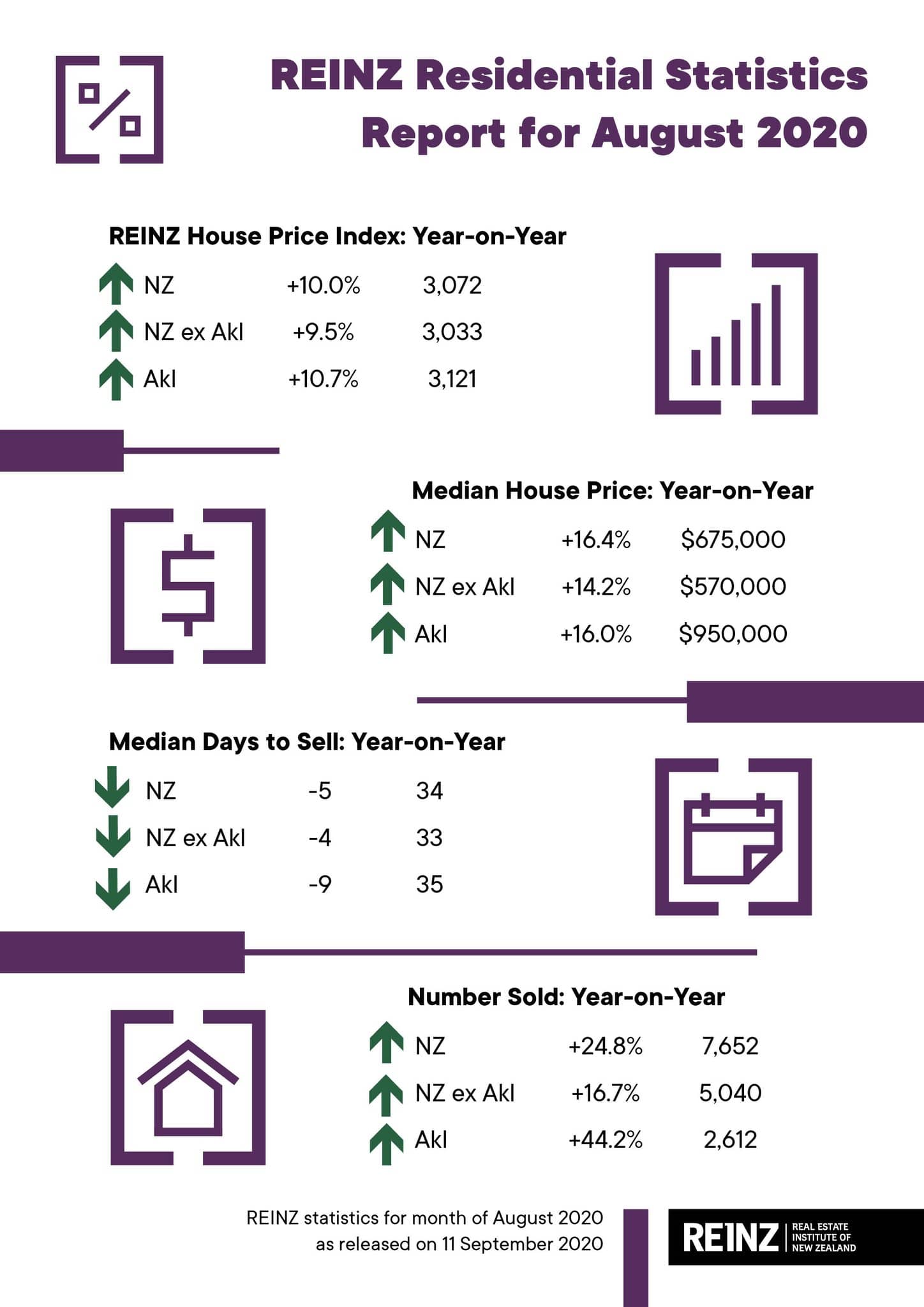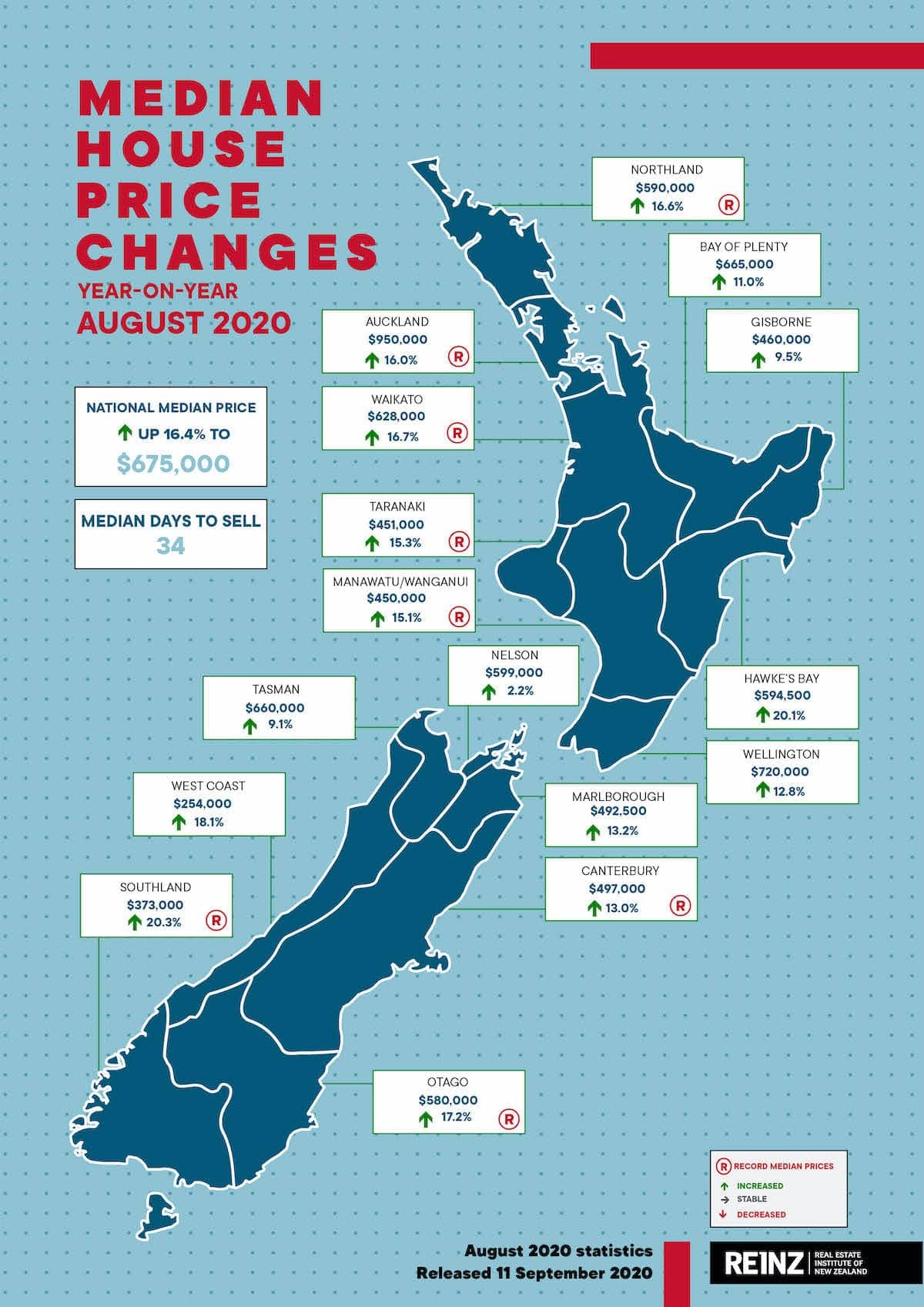
(11-minute read)
Judging by the usual economic indicators, you would never guess New Zealand is in a severe crisis.
This tells us something about the economic and monetary system we inhabit.
We are living in the economic equivalent of a Potemkin village. It all looks pretty – but it is too good to be true.
Earlier in the month data from Real Estate Institute of New Zealand (REINZ), Realestate.co.nz, CoreLogic and Barfoot & Thompson all reported widespread price growth (as opposed to price decline) and high demand.
However, in its Pre-election Economic and Fiscal Update (PREFU), Treasury forecast that the average house price will fall 5% by June next year, before rebounding as economic confidence recovers and immigration picks up.
Treasury has got it wrong in its forecast – even though the country is officially in recession.
There are simply more factors in real estate’s favour, than there are against.
At the end of the article you will find out 25 Reasons Why Auckland House Prices Are Rising – and Counting (by Tony Alexander).
Auckland’s median house price increased by 16% to $950,000 a new record high up from $819,000 at the same time last year.
It was the strongest percentage gain in house prices in August since 2003. The price is up from $918,097 in July this year (a 3.5% increase).

The Level 3 ‘lockdown’ imposed on Auckland from 12 – 30 August had little impact on sales volumes, with last month seeing the highest number of properties sold in an August month for 5 years.
The number of properties sold in August increased by 44.2% year-on-year (from 1,812 to 2,612) – the highest for the month of August in 5 years.
It shows how the adoption of digital & online tools has been a key factor in keeping the property market moving as we moved back up the Alert Level system.
Auckland saw the median number of days to sell a property decrease by 9 days from 44 to 35 year-on-year, the lowest for the month of August in 4 years.

The Level 3 ‘lockdown’ imposed on Auckland from 12 – 30 August had little impact on sales volumes, with last month seeing the highest number of properties sold in an August month for 5 years.
The number of properties sold in August increased by 44.2% year-on-year (from 1,812 to 2,612) – the highest for the month of August in 5 years.
It shows how the adoption of digital & online tools has been a key factor in keeping the property market moving as we moved back up the Alert Level system.
Auckland saw the median number of days to sell a property decrease by 9 days from 44 to 35 year-on-year, the lowest for the month of August in 4 years.
Low interest rates and a lifting of loan to value ratio restrictions have contributed to growth in house prices that has more than offset economic nervousness given repeated lockdowns in Auckland.
Rising asset prices are not a surprise when you lower interest rates in “normal” economic times, but it has been a surprise to everyone how much prices have risen given the unusual economic backdrop of the ongoing potential for further lockdowns that reduce economic activity and increase unemployment.
The point of lower interest rates is to stimulate investment, some in business, but also in residential investment, one result of which is a wealth effect that increases demand for retail and other goods and services in the economy.
But it does also provide big windfall gains to asset owners.
The city had the second highest percentage of auctions in New Zealand with 31.0% of properties (811 properties) sold under the hammer up from 18.3% at the same time last year (332 properties).
This was the highest percentage of auctions Auckland has seen for 5 months.
Auctions have become more popular with buyers spread across the market and houses in the middle price ranges selling well.
In Central Auckland, there has been a lot of competition for apartments from both owner occupiers and investors.
Additionally, there has also been an increase in pre-auction offers as buyers look to secure a property ahead of the market.
It is likely that the momentum will continue for the remainder of the year and we may even see an increase in new listings as people assess where they are financially.
25 Reasons Why Auckland House Prices Are Rising – and Counting
Treasury warn that house prices might fall 7% from their current levels.
But chances are they are much too pessimistic and the recent rise in prices will continue, though at a slightly slower pace because there will be some bounce-back effect in price gains these past three months.
Average NZ house prices now sit 1.5% above levels in March. Here are 25 reasons why Auckland house prices have surprised us with their strength.
Many (not all) of these factors will continue to apply over the coming year and beyond.
1. Interest rates
The Reserve Bank cut the official cash rate 0.75% in March and since then floating mortgage rates have fallen to near 4.5% from 5.3%.
The two-year fixed rate has fallen to 2.65% from 3.55%. Term deposit rates have also fallen, with the six-month rate going to 1.3% from 2.3%.
Lower interest rates have made purchasing a home more affordable, and encouraged investors seeking higher yield than now offered in bank term deposits to look at other assets including property.
2. Interest rate expectations
It is not just that interest rates are low.
The Reserve Bank have made it clear that they intend to keep rates low for many years, with assistance from the US Federal Reserve which has just shifted their policy stance toward multiple years of low rates to try and generate inflation above 2% for a number of years.
Also, our central bank has indicated it may introduce a negative official cash rate next year.
Expectations that interest rates will stay low are encouraging people to expect that other people in the future will be seeking higher yielding assets including property.
So, they are buying before this expected extra demand comes along.
3. Migration boom
Even before we had heard of Covid-19, from the middle of last year a change was occurring in the net flow of Kiwis across our borders from negative to positive 2,800 come the end of 2019.
By March this year the net Kiwi flow was +13,000, contributing to a record net inflow for all countries of 90,000 from 50,000 a year earlier.
We already have in the country the net migration gain we expected would be recorded by just after the middle of 2021.
This means extra pressure on rental accommodation, allowing investors to (now) raise rents, whilst discouraging them from selling and encouraging more purchasing.
4. Migration expectations
Most Kiwis expect that when the borders reopen, we will see a great number of our expats coming home – along with many foreigners wanting to shift here.
Expectations of a coming horde which will purchase property is encouraging extra purchasing now – especially with people swapping stories of expats buying property unseen whilst still offshore.
The numbers doing so are however probably very low.
5. Migration Data
And third in the migration spot, it is entirely possible that despite our borders being closed, in a few months our monthly net migration numbers will be back above 1,000.
Why? Because the chances are high that inflows into NZ through quarantine will stay firm (though easing) ahead of the borders one day reopening.
But outflows will peter off as the government makes it easier for visa holders to remain here, and long-term foreign visitors will have already departed.
This possible yet-to-arrive factor will add to expectations of a return to high annual net migration inflows when the borders open.

6. LVR Removal
In March the Reserve Bank announced that it was removing Loan to Value Ratio requirements.
First home buyers have read this to mean that banks will accept much smaller deposits, and they have entered the housing market in high numbers.
7. Cash Build-ups
During seven weeks of lockdown, young people built up cash savings through wage income continuing, but spending on bars, clothes etc. no longer being possible.
They also now have spare cash which had been allocated for overseas travel.
For some this will have encouraged efforts to build a deposit now rather than later, and in seeing their deposit grow they have entered the housing market.
8. Travel and Housing Switch
Unable to travel, but still wanting to, it is likely that some young people have decided to switch their planned spending timing between travel and housing.
They have changed from planning to travel then look to buy a house, toward buying a house first, then later on travelling.
9. Expected Reduced Construction
Although monthly dwelling consents have yet to trend downward, the expectation of most people is that the Covid-19 shock and tightening of bank lending criteria will lead to a reduction in house construction over the next couple of years.
Reduced supply will tend to place upward pressure on prices unless demand also declines.
10. Unemployment of Non-home Owners
The bulk (not all) of the people losing employment as a result of the Covid-19 shock are in the retail, hospitality, tourism, entertainment, and accommodation sectors.
They tend to be young, earning below average wages, and not home owners.
The Household Labour Force Survey says 90% are females, but I have found the below- headline numbers in the HLFS to be quite volatile in the past, with changes that don’t seem to line up with reality.
So, chances are, it is not true that 90% of the job loss burden is being borne by females.
Unlike previous recessions, we are not seeing many distressed sellers in the property market.

11. A Focus on Home
Around the world people have turned their attention to their immediate living arrangements.
This has produced a boom for the home renovation sector.
Focussing on improving one’s nest is easier if one owns the property and can change it around at will, as compared with renting.
Therefore, the Covid-19 shock has probably produced a desire to shift from renting to owning.
12. Listings Shortage
We went into the Covid-19 shock in March with the stock of property listings around New Zealand down 27% from March 2019 and 64% from March 2010.
At the end of August, listings were still 13% down from a year earlier.
By comparison, in March 2019 listings were ahead 3% from March 2018.
So, we entered the shock with a rapidly growing shortage of listings.
13. Hidden Buyers
It is likely that over the past four years a high number of people wanting to buy a property had given up in the face of rising prices and insufficient listings.
Seeing the Covid-19 shock come along, some of these buyers not active in the market are likely to have become incentivised to re-engage amidst hopes of distress bringing many new vendors to the market.
14. Fear of Not Being Able to Repurchase
There is now so much awareness of a shortage of stock that agents are reporting vendors as being unwilling to sell because they do not want to run the risk of being unable to quickly purchase a new suitable property.
The listings shortage has started to feed on itself in a self-perpetuating manner.
15. Fear of Missing Out
This is known as FOMO. It has been around forever, but in past periods of strong house price growth in New Zealand is not a term which has been in common usage.
It means, in the current context, people have become concerned that if they do not make a purchase now, they will miss out on a likely capital gain or on the opportunity to buy something at all.
This fear of missing out is encouraging people to make a purchase as early as possible – dragging future purchasers into the market now, before their intended purchase timing of perhaps next year or 2022.
16. High Household Wealth
It is not true that Kiwi households are poor, even though the common message is that we are.
We are meant to believe that we all live with high levels of debt which will one day cripple us, house prices, and our country’s future.
In truth, household debt amounts to some $300bn.
But household housing assets amount to near $900bn, and financial assets like shares, managed funds, company ownership, bank deposits etc., amount to $1 trillion.
Net worth is around $1.6tn. Some 43% of owner occupiers do not have a Mortgage.
Not everyone passively manages their net worth.
Sensing a need to gain a decent return and perhaps an opportunity in the housing market, plenty of people are able to become property investors.
17. Giving up on Travel Dreams
Many people have assumed international travel may not be possible for a number of years.
Some of these people have decided to purchase a second property to use for holiday purposes in New Zealand, and this probably helps explain the limited decline which has occurred in Queenstown Lakes District property prices (down only 1.9% in the three months to August from a year earlier, versus a nationwide rise of 1.3%, and Dunedin City fall of 3.1%).
18. Money Printing
This is something new for New Zealand.
Overseas experience shows that central bank buying of bonds and conversion of bond investors’ bond assets into a bank cash deposit places upward pressure on asset prices including shares and property.
The Reserve Bank admitted in May that there is a risk their bond buying pushes up asset prices, and it is now commonly discussed that their actions are contributing to higher house prices – often in the context of a debate about their contribution to a widening of the wealth gap in our country.
Growing awareness of the impact of the RB’s actions is likely to be contributing to a desire by people to buy before the RB causes prices to rise further.
19. Mortgage Deferrals
The introduction of this scheme and its extension to March next year will have taken away the immediate pressure on many people to sell their house through inability to meet mortgage payments.
The scheme has reduced current seller numbers.
20. Good Financials Leading into the Covid-19 Shock
Household debt in the five years leading into this shock grew near 40% compared with 80% in the five years ahead of the 2008-09 Global Financial Crisis.
More than that, the introduction of LVRs in 2013, plus the application by banks of high test interest rates for assessing debt servicing capacity of borrowers, meant there was little high-risk housing debt heading into the shock.
This has limited mortgage stress – as these measures were designed to do.

21. Lack of Bank Staff
Banks have not had the staffing resources to handle many mortgagee sales, with personnel running off their feet adjusting to working from home and processing credit assistance applications from businesses and homeowners.
22. Soaring Share Prices
Share prices rose very sharply from late-March and this may have encouraged a positive view by investors of other, less rapidly repriced assets – like property.
23. Job Losses for Migrants
Just as many job losses are hitting young people who do not own homes, they are also hitting the many migrants on working visas who were present in the accommodation and hospitality sectors in particular.
Heading into this downturn 8% of jobs in New Zealand were held by migrants, compared with 4% at the start of the GFC.
To the extent migrants bear much of the burden of unemployment, this does not produce a hike in the number of distressed property sellers, because they will not be property owners.
24. Quiet Government
A key point I made many months ago was that calls by large bodies for house prices to decline in the interests of social equity would disappear.
I noted that neither the Reserve Bank, banks, Treasury, or Government would want house prices to be falling this year.
Falling prices would make the economic downturn worse.
It has come to pass that we rarely read of desires these days for house prices to fall, and lack of such expressions from senior government members in particular has removed one factor which might have stayed the hand of many potential property purchasers, whilst also potentially encouraging some sellers.
Policy makers want house prices to rise.
25. Wage subsidies
Were it not for the three rounds of wage subsidies to employers to keep staff on there would be a lot more people unemployed currently.
The absence of this unique employment shock has reduced the number of property sellers and kept many potential buyers engaged with the market.
Source: Real Estate Institute of New Zealand (REINZ), Tony Alexander (Independent Economist) and David Norman (Chief Economist at Auckland Council)
What do you think about it? Tag me on your favourite social media (Facebook / Instagram / LinkedIn / Twitter).
P.S. I research and interview economists, NZ investors and profitable companies to find tools & tactics that you can use to achieve financial freedom.
➔ Join my private newsletter to be the first one to learn insider tips! Here are examples of what you’ll get. It’s FREE. You can unsubscribe at any time. I treat your email as my top secret.
IMPORTANT: This article is of general nature only and readers should obtain advice specific to their circumstances from professional advisers.